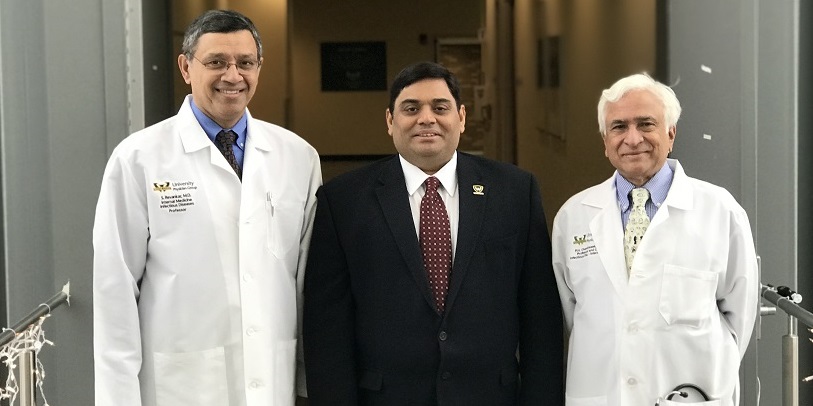
Pictured from left are Sanjay Revankar, M.D., Ashok Kumar, Ph.D., and Pranatharthi Chandrasekar, M.D.
A collaborative team of researchers, physicians and a medical student at the Wayne State University School of Medicine has uncovered the therapeutic efficacy of Isavuconazole, a newer antifungal drug, in an experimental animal model of ocular fungal infections, indicating that it may successfully treat human ocular infections.
Fungal endophthalmitis remains a significant cause of vision impairment and blindness, in part because of delayed diagnoses and limited availability of effective antifungal agents with good ocular penetration. Aspergillus endophthalmitis is a particularly difficult disease to treat, the researchers said. The treatment, whether given orally or intravenously, reduced fungal burden in an infected model's eyes, and preserved retinal structural integrity and function, resulting in significantly improved disease outcomes.
"The key anatomic barriers that hinder adequate treatment of endophthalmitis are the presence of blood-retinal barriers. Therefore, direct injection of drugs into the eye remains the primary route for the treatment of retinal diseases, including fungal endophthalmitis. The major impact of our study is that Isavuconazole can be given orally, and as effective as injections, avoiding the invasive intravenous procedure, which is painful and often leads to more complications," said principal investigator Ashok Kumar, Ph.D., an associate professor of Ophthalmology, Visual and Anatomical Sciences, and of Biochemistry, Microbiology and Immunology.
His team included co-investigators Pranatharthi Chandrasekar, M.D., a professor of Internal Medicine and chief of Infectious Diseases; Sanjay Revankar, M.D., a professor of Internal Medicine who directs the School of Medicine's Infectious Diseases fellowship; Pawan Kumar Singh, Ph.D., a research scientist in Dr. Kumar's lab; and fourth-year medical student John-Michael Guest. Guest won third place at the 2018 Medical Student Research Symposium for his poster about the work.
The study results were published in the November issue of the journal Antimicrobial Agents and Chemotherapy.
"Over the past two decades, the incidence of endophthalmitis has risen steadily, primarily due to the increased popularity of sutureless cataract surgery, small-gauge vitrectomy and monthly intravitreal injections of anti-vascular endothelial growth factor drugs for the treatment of age-related macular degeneration and diabetic retinal diseases," Dr. Kumar said. "Among various etiologies of infectious endophthalmitis, the fungal endophthalmitis, specifically those caused by the Aspergillus species, poses the biggest challenge, due to the limited availability of effective antifungal agents, lower tissue penetration and their associated dose-limiting ocular toxicity."
This work was supported by investigator-initiated funding from Astellas Pharma Global Development Inc. (ISR001314) to Dr. Kumar, who is also supported by two National Institutes of Health R01 awards (EY026964 and EY02738).